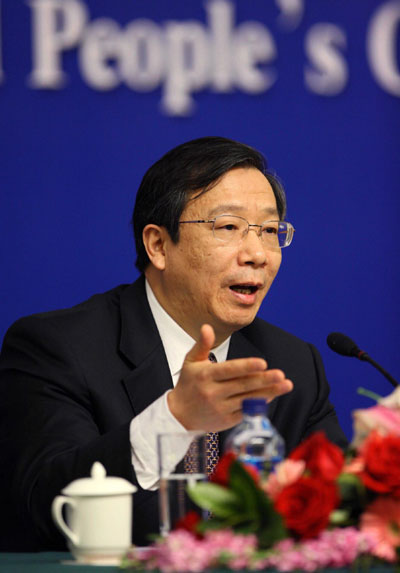Top Biz News
China calls US Treasuries important, wary on gold
(Agencies)
Updated: 2010-03-09 16:21
 |
Large Medium Small |
|
|
BEIJING - China, the world's biggest holder of foreign exchange reserves, renewed its commitment to the US Treasury market on Tuesday but said it would be wary of adding to its gold holdings.
The country's chief currency regulator said China would attract more capital inflows this year, but he left the market none the wiser as to when Beijing might let the currency resume its rise.
"The US Treasury market is the world's largest government bond market. Our foreign exchange reserves are huge, so you can imagine that the US Treasury market is an important one to us," Yi Gang, head of the State Administration of Foreign Exchange (SAFE), told a news conference.
China's reserves are the world's largest and, with such large sums at stake, even marginal portfolio shifts have the potential to move markets.
Speaking during the annual session of top legislature, Yi expressed the hope that China's presence in the US Treasury market would not become a political football. China, he stressed, was not in the game of short-term currency speculation.
"It is market investment behavior, and I don't want it to be politicized," he said. "We are a responsible investor, and we can surely achieve a win-win result in the process of investing."
Yi dampened hopes of gold bugs that China might be itching to add to the 1,054 tons of the metal in its reserves.
On a 30-year horizon gold was not a great investment, he said, and China would simply drive up prices if it piled into the market.
"It is, in fact, impossible for gold to become a major investment channel for China's foreign exchange reserves. I have 1,000 tons now, and even if I doubled that holding, according to current prices, that would be about $30 billion," Yi said.
The bullion price fell about $3 an ounce on Tuesday morning to around $1,121 an ounce.
Not all China's eggs in one basket
Yi said SAFE had appropriately spread its holdings, with the US dollar, the euro and yen as well as some emerging market currencies in China's portfolio.
"The foreign exchange reserves are mainly invested in bonds issued by governments and government agencies of the developed and developing countries with high credit ratings, assets issued by companies and international organizations, funds and so on," he said in a prepared statement before meeting reporters.
The official cast no light on the prospects for the yuan, which China has effectively re-pegged at around 6.83 yuan per dollar since mid-2008 to help its exporters weather the global credit crunch.
Yi repeated that China would keep the currency basically steady and sidestepped a question about remarks by central bank governor Zhou Xiaochuan.
Zhou broke new ground on Saturday by stating that China would sooner or later exit the "special yuan policy" adopted to counter the financial crisis.
In the absence of fresh guidance, the yuan marked time in the offshore non-deliverable forwards (NDFs) market.
| ||||
But Yi said expectations of a stronger yuan would intensify this year, attracting "cross-border arbitrage" funds, because of the country's relatively high interest rates.
Proceeds from exports would also rise as global recovery generated demand for Chinese goods.
"With foreign direct investment expected to increase steadily, China will be facing greater pressures from the rising amount of foreign exchange inflows," he said.
"And there will be a tendency for a larger portion of the assets of enterprises and institutions to be converted to domestic currency, with a greater portion of liabilities of enterprises and institutions converted into foreign currencies," Yi added.














